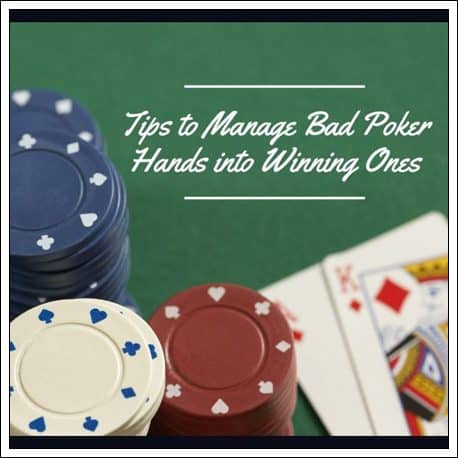
No one ever said that playing poker was easy – it’s a complex game with many strategic considerations. However, even the best poker players will experience bad poker hands sometimes. When this happens, it’s essential to know how to manage the hand and turn it into a winning one. This blog post will explore some practical tips to help you manage bad poker hands and come out on top.
1. Don’t play every hand.
One of the most common mistakes made by beginner poker players is playing too many hands. Just because you’re dealt a hand doesn’t mean you have to play it. If your cards are poor, fold them and wait for a better opportunity.
2. Know when to bluff.
Bluffing can be a great way to win a hand, but only if done correctly. If you’ve been playing tight all game and suddenly start bluffing, your opponents will likely see right through it. You can practice bluffing when you play online poker free games. Use bluffing as a tool sparingly and only when the situation warrants it.
3. Study your opponents.
Knowing your opponents is one of the best ways to win at poker. Take some time to study their playing style and tendencies. Doing this will give you a better idea of when they’re likely to bluff or fold, which can help you make your own decisions.
4. Be patient.
Good things come to those who wait. If you’re stuck with a bad hand, don’t get impatient and start making reckless decisions. Take your time, observe the other players, and wait for an opportunity to strike.

5. Know when to fold.
This tip ties in with being patient. Sometimes, the best thing you can do is simply fold your hand and live to fight another day. There’s no shame in admitting defeat and cutting your losses.
6. Don’t get attached to your hand.
Getting too attached to a hand can be easy, especially if it’s a good one. But the fact is, any hand can lose. Don’t let your emotions get the better of you; always be willing to fold if the situation warrants it.
7. Pay attention to the pot size.
The size of the pot can be a helpful indicator of whether you should stay in or fold. If the pot is small, it’s usually not worth risking many poker chips on a poor hand. However, if the pot is large, you may want to stay in and try to turn your hand into a winner.
8. Know when to call.
Calling can be tricky, as you don’t want to give away too much information about your hand. However, sometimes a call is the best move you can make. If you’re confident in your hand, don’t be afraid to call and see what the other players do.
9. Don’t show your cards.
This tip should be obvious, but it’s worth repeating: never show your cards to anyone at the table. Doing so will only give away information that your opponents could use against you later.

10. Be aware of the board.
The board is the term used to describe community cards in a poker game. These are the cards that everyone can see and use to make their hand. Pay attention to the board at all times and adjust your strategy accordingly.
11. Watch for Tells.
A tell is a physical or verbal cue that gives away information about a player’s hand. Experienced players will often use tells to their advantage, so it’s essential to be aware of them. If you see players fidgeting or avoiding eye contact, they may be bluffing.
12. Keep your emotions in check.
Poker is an emotional game, but it’s essential always to keep your cool. Getting angry or upset will only cloud your judgment and make it more challenging to make sound decisions.

13. Take breaks.
Playing poker games for long periods can be tiring and stressful. If you start to feel overwhelmed, take a break from the table and clear your head. You can come back refreshed and ready to take on the competition.
14. Manage your bankroll.
Poker can be costly, so managing your bankroll is essential. Only gamble with money you can afford to lose, and be sure to set limits on how much you’re willing to spend.
15. Have fun.
Remember, poker is supposed to be enjoyable. If you’re not having fun, then there’s no point in playing. So relax, have a good time, and don’t take things too seriously.
Poker is a thrilling game that can be both fun and rewarding. However, it’s important to remember that not every hand will be a winner. Sometimes, you find yourself with a bad hand, but don’t let that discourage you. Poker is a game of both luck and skill. No matter how bad your hand may seem, there are always ways to turn the tables and come out on top. With a bit of practice with online poker free games and these handy tips, you can manage any poker hand – even the worst ones. So what are you waiting for? Sign up at GGPoker today and start improving your skills. Who knows, maybe you’ll be the next big winner!
Leave a Reply
You must be logged in to post a comment.